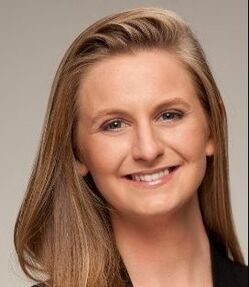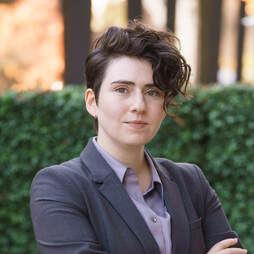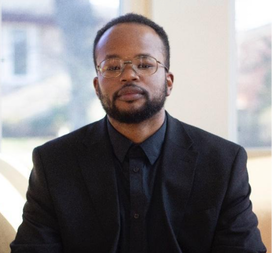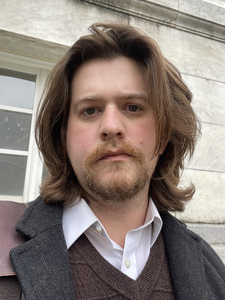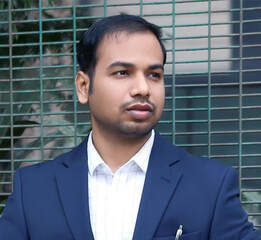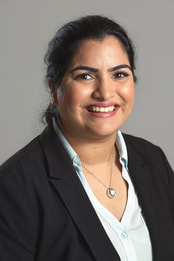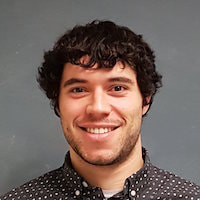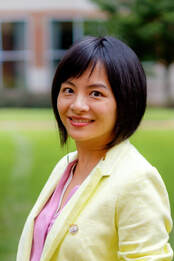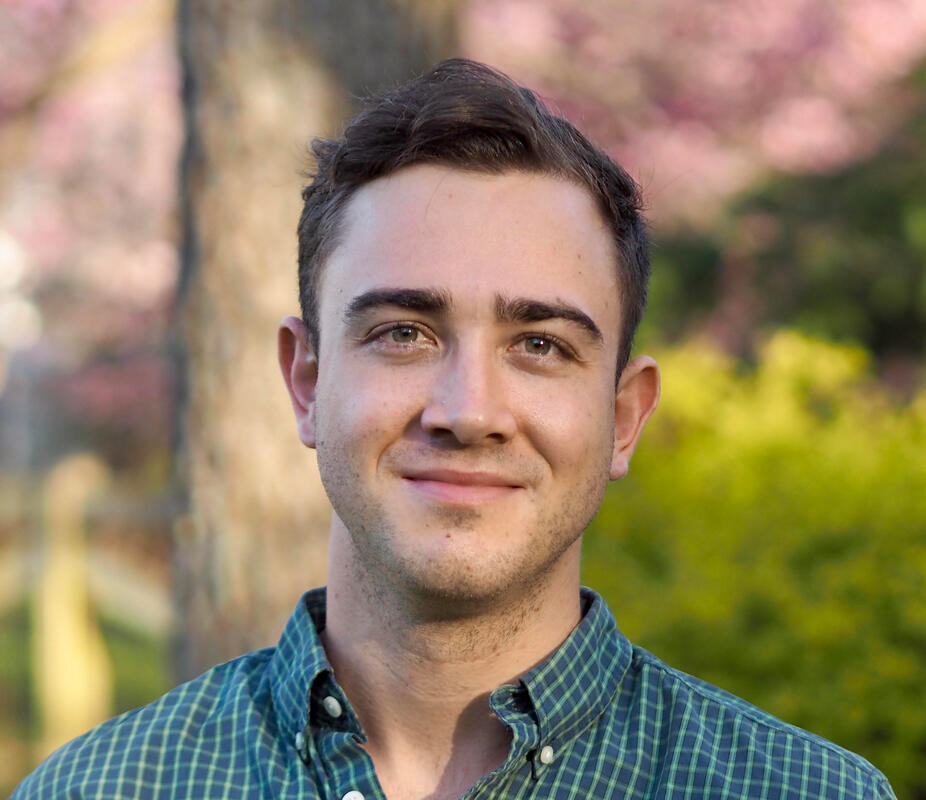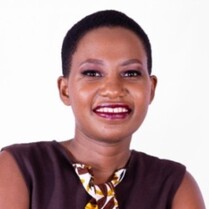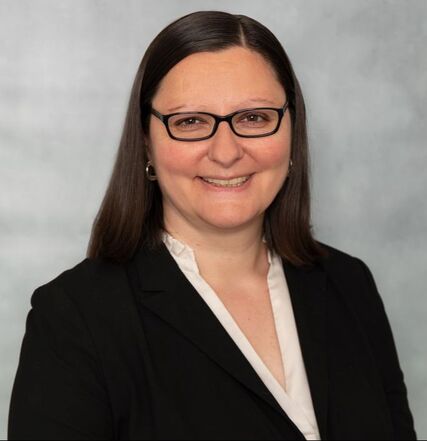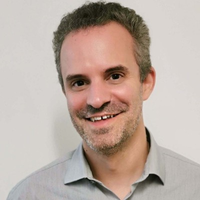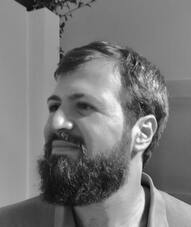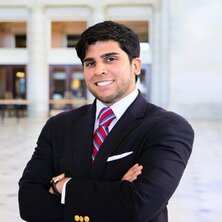The JSPG staff
JSPG staff are dedicated to the empowerment of students, postdocs, policy fellows, and early career professionals in science policy debate across all disciplines and professions around the world. JSPG staff are leading outreach, partnership development, communication, fundraising, and operations.
|
Chief Executive Officer and Managing Publisher
|
Julianne McCall is the CEO and Managing Publisher at the Journal of Science Policy & Governance. By day, Julianne serves as Co-Director of the California Initiative to Advance Precision Medicine, housed within the Governor's Office of Planning and Research. In that role, she oversees cross-sector health policy working groups and projects, research grantmaking, and state government interagency efforts, which include serving on Governor Newsom's COVID-19 Testing Task Force and as a co-author of the first CA Surgeon General's Report on Adverse Childhood Experiences. Previously, Dr. McCall worked on public health and research policy in the California Senate Office of Research and as a Science and Technology Policy Fellow of the California Council on Science and Technology. Prior to her career in policy, she spent sixteen years in neuroscience research labs, including the Salk Institute, Stanford University, the Cleveland Clinic, and the National Center for Microscopy Imaging Research. She conducted medical research as a Fulbright Fellow in Sweden and as a neuroscientist at the Neuroregeneration Laboratory of Heidelberg University in Germany.
In the community, Dr. McCall teaches graduate courses in Science Policy at UC Riverside and UC Davis, serves on the Editorial Board of the California Journal of Politics and Policy, occasionally directs the International "Brain Bee" Neuroscience Olympiad for high school students across fifty countries, and is the co-founder of TEDxFulbright, the Sacramento Brain Bee, and a chapter of the Sustained Dialogue Campus Network for racial justice. She earned a PhD in Neuroscience from Heidelberg University in Germany, a Master's degree in Biomedical Sciences from UC San Diego, and a Bachelor's degree in Neuroscience from Denison University. |
|
Director of Programs and Events
|
Hannah Frye is the Director of Programs and Events. Hannah is a Senior Policy Advisor at the MIT Washington Office. As a JSPG published author, expansive thinker, and generous team player,
Hannah received her Ph.D. in neuroscience at Washington University in St. Louis, and her B.S. in chemistry with a biochemistry emphasis and a minor in biological sciences from Missouri University of Science and Technology. Her doctoral work focused on dissecting the interplay of genetics and biological sex on memory and opioid use disorder risk. Hannah has served as a guest editor with the Journal of Science Policy and Governance, as an early career policy ambassador with the Society for Neuroscience and as the policy and advocacy chair for the graduate student science policy group ProSPER at Washington University. |
|
Director of Communications
and Public Affairs |
André Porter is the Director of Communications and Public Affairs at the Journal of Science Policy & Governance. A science-policy professional, André Porter is a Senior Program Officer at the National Academies of Science, Engineering and Medicine. Prior to his time at NASEM, André managed field operations as the Policy Director for Science is US at the American Association for the Advancement of Science. His professional experience includes working in government and non-governmental organizations to advance policies that impact the U.S. STEM enterprise and increase the use of peer-reviewed scientific evidence in policymaking. André has engaged stakeholders across the U.S. to highlight and amplify their perspectives and facilitate their national and local decision-making participation.
Before his time at AAAS, André was the Science Policy Analyst for the American Society for Biochemistry and Molecular Biology. At ASBMB, his responsibilities included tracking and leading formal responses to federal policies that directly impacted the ASBMB's members. In addition, he organized advocacy campaigns to increase federal support for scientific agencies such as the National Science Foundation, National Institutes of Health, and the Department of Energy. He has participated in several coalitions, including the Coalition for National Science Funding, the STEM Education Coalition, the Coalition for Health Funding, and NDD united. During his time in the federal government, André worked at the National Science Foundation in the Division of Graduate Education and the U.S. Environmental Protection Agency's National Center for Environmental Research. His responsibilities included program management and development for graduate and undergraduate STEM education programs, transdisciplinary capacity building, portfolio evaluation, research dissemination, and increasing diversity, equity, and inclusion for underrepresented groups in STEM. André holds a B.S. and M.S. in biology from Howard University. His passions involve advancing the use of scientific evidence for decision-makers, increasing participation of underrepresented groups in science policy, and the intersection of science policy and diplomacy to facilitate innovation. |
|
Podcast Director and Producer
|
Aaron Conrado is the Podcast Director and Producer at the Journal of Science Policy and Governance. By day, he is a Program Coordinator and Senior Analyst at Noblis where he supports the Department of Homeland Security in the office of University Programming. He previously served as a Highly Qualified Expert at the Office of Counternarcotics and Stabilization Policy (CN&SP) in the Department of Defense (DoD). In this role, he supported CN&SP through working on peacekeeping policy, including UN reform, improving peacekeeper performance, building partner capacity, and leading DoD efforts toward the 2021 high-level Peacekeeping Ministerial in South Korea. Aaron formerly served as a Science and Technology Policy Fellow through The American Association for the Advancement of Science in the same office at DoD, bringing his scientific training in evidence-based decision making to a novel field.
He also serves as a Lecturer at The Archer Center in Washington DC, where he leads discussion sections for Dr. Joel Swerdlow’s “The Politics of National Memory” class, as well as lectures on the intersection of science and democracy, and how scientific practices and ways of thinking can better inform public policy and good governance. Aaron got his start in science policy when he served as an intern at the Office of Science and Technology Policy, where he worked on policy topics such as STEM education, GMOs, A.I., biomedical research, and biosecurity. After a brief stint moonlighting as a cocktail bartender, he found his way back to policy, and is now seeking further opportunities to support the science policy community. Aaron holds a B.S. in microbiology from The University of Oklahoma, and a Ph.D. in microbiology and molecular biology from The University of Texas at Austin. In his time in graduate school, he co-hosted “They Blinded Me With Science”, a live radio show and podcast where he interviewed UT Austin researchers about their work and passions. He was also an associate editor on the “Sci on the Fly” podcast during his time as a AAAS STP Fellow. |
|
Director of Outreach & Engagement
|
Suryesh Namdeo is Director of Outreach & Engagement of the Journal of Science Policy & Governance. Suryesh is a visiting scholar at DST Centre for Policy Research (DST CPR) at the Indian Institute of Science, where he contributes to policy research projects on Biosecurity, Science Diplomacy and Open Science. He earlier worked as the Programme Officer of the Science, Technology and Innovation (STI) Policy Fellowship Programme of the Department of Science and Technology, Government of India at the DST CPR, Indian Institute of Science. His responsibilities included the overall coordination of the programme, capacity development and partnership building.
Previously, Suryesh worked with the United Nations Office for Disarmament Affairs in Geneva. More specifically, he worked as the Science and Technology consultant with the Implementation Support Unit of the Biological Weapons Convention (BWC). Here, his responsibilities included facilitating advice on the latest advancements in Science and Technology in the areas of biosafety and biosecurity. He is a co-author and signatory of the UN supported ‘Seoul Youth Declaration for Disarmament’ and the Youth Declaration for Biosecurity’. Further, he is a member of the executive team of Science Policy Forum (SPF), an open, independent, collaborative platform to promote science and technology policy in India. SPF was the official partner with DST and the Office of the Principal Scientific Adviser to the Government of India (O/o PSA) for the public consultation process of the draft national STI policy. He led the social media outreach for SPF and also contributed to the Emerging Technology Initiative in partnership with the O/o PSA and the Indian foreign ministry. He holds a PhD in Molecular Biology from the Max Planck Institute for Biology, Tuebingen, Germany. He is a member and the international relations coordinator of the Indian National Young Academy of Sciences (INYAS). |
|
Director of Operations
|
Maria Qadri is the Director of Operations at the Journal of Science Policy & Governance. Maria currently serves as the Scientific Communications Postdoctoral Fellow for the Knowledge Transfer and Outreach arm of the NSF-funded Center for the Advancement of STEM Leadership (CASL) based at the Association of American Colleges and Universities (AAC&U) in Washington, DC. Within CASL and the AAC&U Office of Undergraduate STEM Education, her research centers on capacity building for thought leadership and professional development programming for STEM faculty. In her work, she aims to empower STEM faculty, particularly those at Historically Black Colleges and Universities, to share their authentic narratives and invaluable insights as broadly as possible through both traditional and non-traditional avenues. Before joining AAC&U, Maria worked in science policy and project management consulting at Ripple Effect, and as editorial staff at the American College of Radiology.
Throughout her career, her professional and scholarly work has been committed to accessible and inclusive STEM education, science policy, and science communication. She is an active member of the Association for Women in Science, the National Science Policy Network, and 500 Women Scientists. Qadri earned her Ph.D. in Biomedical Engineering and Quantitative Biomedicine in 2018 from Rutgers University as well as an M.S. from the University of Connecticut and a B.S. from the University of Hartford. |
|
Director of Data Analytics and
Impact Evaluation |
Ben Davis-Purcell is the Director of Data Analytics and Impact Evaluation at the Journal of Science Policy & Governance. He is a science policy professional, physicist, and science communicator.
In his day job, Ben is a Policy Analyst at the Natural Sciences and Engineering Research Council of Canada (NSERC) through the Mitacs Canadian Science Policy Fellowship. He holds a PhD in Experimental Particle Physics from Carleton University (Ottawa, Ontario, Canada), where he worked as a member of the ATLAS Collaboration at CERN. He also holds Master’s and Bachelor’s degrees in Physics from McMaster University. Ben is passionate about science communication and education. He is involved in many outreach and teaching activities, including his role on the Organizing Committee of ComSciConCAN, Canada’s science communication conference for graduate students. |
|
Media Engagement Director
|
Chiungwei Huang is a chemist and science writer. She works for Eastman Chemical Co. as an analytical scientist, where she develops testing methods to diagnose chemicals so that they can be used to improve people's lives. She was a AAAS Mass Media Science and Engineering Fellow in 2022 and reported on science, technology, and health in a way that the average newspaper reader can understand. Chiungwei also guest writes for features and on her blog about social issues of science as a minority, first-generation immigrant, and mother scientist.
At the JSPG, Chiungwei inspires and encourages conversations with new audiences to increase the reach and impact of JSPG’s published work. Chiungwei is passionate about making science accessible and inclusive and as a media-trained scientist, she anticipates growing leadership in science policy to shape the future of science and its impact on humans. Chiungwei holds a PhD in Physical Chemistry from the University of North Carolina at Chapel Hill, USA, and a Master’s and Bachelor’s degree in Chemistry from National Chiao-Tung University, Taiwan. |
|
Director of International Engagement
|
Brendan Phillips is the Director of International Engagement at the Journal of Science Policy & Governance. A public health professional, Brendan is currently an emergency public health consultant with MDB Inc. in Washington, DC and a current student in the Biostatistics MPH program with the Milken Institute School of Public Health at George Washington University.
In his work as a consultant, Brendan works with federal, state, and local government agencies to improve their resilience to public health emergencies such as the COVID-19 pandemic and design emergency response plans. Prior to his work as a consultant, Brendan was a Peace Corps volunteer focused on public health outreach in Togo. At JSPG, Brendan works to advance the journal’s international visibility, reach, and impact of published work. Brendan’s research interest is in using science to investigate the world’s biggest issues including global health, economic development, and biosecurity. |
|
Editorial Program Manager
|
Patience Kiyuka is a Scientist at the Kenya Medical Research Institute, Kenya. Her research interests are in immunology and molecular epidemiology of infectious diseases. Patience is keen on translating research into policy and engaging with policymakers. She is an award-winning science content creator and winner of the prestigious inaugural National Academies Eric Wendy Schmidt award for excellence in science communications. She has also developed community theatre, radio dramas and radio talk shows and used virtual reality technology for science engagement.
|
|
Ambassador Program Manager
|
Seerat Kang is a Project Manager in the Life Events Lab at University of California, Riverside and a Research Assistant at the Stanford University Psychophysiology Laboratory. She received her bachelor's degree in Psychology from University of California, Riverside, and her current work focuses on topics related to emotion regulation, neurocognitive aging, and lifespan. Her policy interests center around ethical health innovation, healthcare transcommunication, and public health at large. Seerat is passionate about Diversity, Equity, and Inclusion both in academia and science policy for early career professionals and academics entering the space. She hopes to provide the tools necessary to platform differing perspectives in policy and science communication to bolster meaningful conversation and research.
|
Advisors
JSPG advisors provide guidance on strategic outreach, engagement and partnership development for the journal to fulfill its mission of empowering students, postdocs, policy fellows, and early career professionals around the world.
|
Strategic Advisor
|
Adriana Bankston is an advocate for scientific research and innovation at the federal level.
For close to a decade, Adriana has worked to nurture U.S. competitiveness in science and technology through a number of roles with universities, non-profits and scientific societies. Adriana works at the intersection of scientific research, higher education and STEM workforce development with a focus on science policy to advance our nation forward through evidence-based practices and empower the next generation to get involved. As the incoming first-ever AAAS/ASGCT Congressional Policy Fellow, Adriana will contribute to our nation's advancement in science and technology by providing high-quality, science-based, independent guidance to federal policy makers on Capitol Hill starting fall 2024. Previously, Adriana supported scientific research and the STEM workforce as a Principal Legislative Analyst with University of California Federal Governmental Relations, where she advocated for the university’s research priorities with Congress, the Administration and federal agencies. Prior to this role, Adriana highlighted federally funded research as a Policy & Advocacy Fellow with the Society for Neuroscience, where she provided staff support for special and on-going projects, including SfN’s annual lobby event and the society’s annual meeting. As a Senior Fellow in Science Policy at the Federation of American Scientists, Adriana advanced policy entrepreneurship to make the work of policymakers more impactful and help realize the potential of landmark legislation by assisting the federal government in fostering innovation and U.S. competitiveness. Adriana continues to connect science and policy as a Biomedical Workforce & Policy Research Investigator with the SAi Resident Collective, and on the AAAS Section X Steering Group. Adriana contributes to building future policy leaders as a Policy Advisor for the inaugural Science Policy and Advocacy for Research Competition (SPARC) program hosted by the Universities Research Association (URA), serving graduate students in STEM interested in science policy and culminating with in-person advocacy with Congressional staff. She was also CEO & Managing Publisher of the Journal of Science Policy & Governance, an internationally recognized, open-access peer review publication at the intersection of science, technology, innovation, public policy and governance. Adriana’s writing in science policy and advocacy appeared in outlets such as Issues in Science & Technology, Inside Higher Ed and the Union of Concerned Scientists Blog. Additionally, Adriana gave many national and international talks and workshops on policy and advocacy, including at the AAAS ERN Conference, NASEM and UN Science Summit. Adriana worked as a consultant with Sigma Xi, The Scientific Research Honor Society and other organizations. In recognition of her work to support the U.S. scientific enterprise, Adriana received a number of honors and awards, including the inaugural ARIS Emerging Broader Impacts Leader Award, and the Top 20 in 2022 Award For Excellence in Advocacy from The Advocacy Association. Adriana earned her Ph.D. in Biochemistry, Cell and Developmental Biology from Emory University. Connect with Adriana on Twitter and LinkedIn. |
|
Senior Advisor for International Engagement
|
Jean-Christophe (JC) Mauduit is JSPG's Senior Advisor for International Engagement. By day, JC serves as a Lecturer in Science Diplomacy at University College London Department of Science, Technology, Engineering in Public Policy (UCL STEaPP). He was previously a Visiting Scholar at the American Association for the Advancement of Science (AAAS) in Washington, D.C. and former Associate Director of the Science Diplomacy Center at The Fletcher School of Law and Diplomacy at Tufts University in Boston, MA.
Initially trained as a scientist, obtaining a BSc in Physics from Paris XI University, an MSc and a PhD (2007) in Astronomy and Astrophysics from the Paris Observatory, he worked for the French National Center for Scientific Research on the European Space Agency “Gaia” satellite mission and at the California Institute of Technology on the NASA “Spitzer” infrared satellite. His career later took him to South Africa, where he was a Project Officer for the International Astronomical Union, overseeing more than forty international projects aiming to develop astronomy research, education, and outreach in over thirty countries. He has also been involved in many science education and outreach programs and was an Associate Editor on the Journal of Science Policy and Governance (2016-2018). He is the co-founder of the Science Diplomacy Club at the Fletcher School, Tufts University, where he recently obtained a Master of Art in Law and Diplomacy (2017). He is a member of the American Astronomical Society, the International Astronomical Union and AAAS. |
|
Advisor for International Outreach
|
Alessandro Allegra is JSPG's Advisor for International Outreach. By day, Alessandro is a science policy professional and scholar interested in understanding and shaping the interface between science, politics, and society in Europe. He currently works as Policy Officer at the European Commission Science Advice Mechanism, and has professional experience in UK, EU, and international science policy, having worked at UNESCO, the Royal Society of London, and the UK Royal Society of Biology. Coming from an academic background in philosophy of science, Alessandro is completing a PhD in Science, Technology and Society (STS) at University College London (UCL), as part of which he spent a year as Fulbright-Schuman Fellow at Harvard’s Kennedy School of Government. He co-founded the #ScienzaInParlamento science policy campaign in Italy, and served as Secretary of the Association of Italian Scientists in the UK (AISUK).
|
|
Senior Advisor
|
Shalin Jyotishi is a senior analyst, writer, and strategist at New America. He is also a Fellow at the World Economic Forum leading Future of Work research and a Forbes contributor covering workforce and education innovation. Shalin’s mission is to solve problems about the workforce, higher education, policy, technological innovation, and their intersections.
Shalin’s expertise has appeared in NPR, Morning Consult, EdSurge, Financial Times, InsideHigherEd, and the Chronicle of Higher Education, and on high-level stages at the United Nations, OECD, World Bank, U.S. National Academies, and the Education Writers Association. Shalin serves or served on advisory boards for the U.S. National Science Foundation, MIT, United Nations, the International Economic Development Council, the American Enterprise Institute, George Washington University’s Institute for Public Policy, and Georgetown University’s Center on Security and Emerging Technology. He was named a 2021 Davos invitee and a University Innovation Fellow by Stanford University. Previously, Shalin was Visiting Scholar at the American Association for the Advancement of Science, the world’s largest scientific society, where he co-authored a book on science and technology policy (Forthcoming MIT Press). He led teams and programs at the Association of Public and Land-grant Universities, North America’s oldest presidential higher education association, to aid university executives with economic and workforce development and R&D innovation. Shalin was CEO of the internationally-acclaimed Journal of Science Policy & Governance and held positions at the American Academy of Arts and Sciences, the University of Michigan, and the Alfred P. Sloan Foundation. Shalin earned his bachelor’s degree from the University of Georgia and his M.S. in Public Interest Technology from Arizona State University. Reach him at Twitter, LinkedIn, and ShalinJyotishi.com. |
|
Founder
|
Max G. Bronstein is the Founder of the Journal of Science Policy & Governance. He holds a Masters in Public Policy and a Graduate Certificate in Science Policy from the Gerald R. Ford School of Public Policy at the University of Michigan. His undergraduate degrees are in biology and writing composition from Ithaca College. Max has held positions at the National Science Foundation, the U.S. House Committee on Science and Technology, the University of Michigan, the National Institutes of Health, and the Michigan Journal of Public Affairs. Max has significant consulting experience in government affairs and non-profit services with a focus on science and technology policy. He is the former Director of Science Policy at Research!America and and the Chief Advocacy and Science Policy Officer of the EveryLife Foundation for Rare Diseases, and former Senior Director of Health Policy & Corporate Affairs at Audentes Therapeutics. Max currently works as an Assistant Director in the OSTP Health & Life Sciences team.
|

